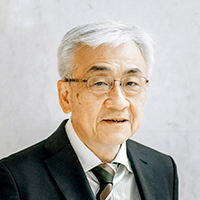
On the Occasion of the 60th Anniversary of JCI
On New Year's Day 2024, a large-scale earthquake struck the Noto region, and it was followed by torrential rains of a scale never seen before. I extend my heartfelt condolences to those who lost their lives in this unprecedented disaster and offer my deepest sympathies to the many people forced to live in evacuation shelters. This disaster has reminded us of the critical mission we bear as professionals involved in construction and concrete engineering.
This year marks the 60th anniversary of JCI, and a commemorative ceremony is planned for July. At our 50th anniversary, we celebrated a half-century of development focused on recovery and growth. Our 60th anniversary, akin to a person reaching their sixtieth year, is a time to aim for continuous renewal and growth while envisioning an era of coexistence between society and nature. Pressing issues such as securing and nurturing talent, addressing environmental and energy challenges, improving productivity, and advancing digitalization require our attention. Last year, we established a forum to discuss next-generation initiatives. The aim is to clarify the challenges that face JCI in the short and medium term as we look to 2030.
These challenges are shared by a broad swath of economic and social activities associated with the concrete and construction industries. Having common challenges facilitates collaboration and mutual coexistence among multiple sectors, and we hope to address longstanding issues through comprehensive solutions and make good progress toward their resolution. JCI was founded as a forum that connects organizations and activities related to architecture, civil engineering, and materials with concrete as the core focus. We recognize this as the unchanging foundation of the Institute, even in these times of significant change.
Reducing carbon dioxide emissions remains a major shared challenge across activities involving the materials industry, ready-mixed concrete, design and planning, construction, as well as management and renewal. JCI continues its efforts to accurately quantify carbon dioxide balances and standardize testing methods. These efforts extend beyond scientific validation to include corporate practices, talent development and internationalization, as well as the rationalization of design and construction processes and productivity improvement. In this context, discussions are ongoing within the framework of next-generation planning regarding a flexible operational structure for addressing short- and medium-term challenges in public interest projects.
The certification schemes are a cornerstone of JCI’s revenue-generating activities and they are positioned as key elements in the social implementation of technology and quality assurance. I would like to once again express my gratitude to all members involved in their administration. Despite the financial regulations for public interest corporations, which stipulate that public interest project expenses must exceed 50% of total expenses, profit generation is prohibited, and surplus funds beyond a specified amount may not be retained, JCI must still carry out revenue-generating activities. While capital reserves enable proactive investments, the strict limitations we operate under necessitate careful risk management. We will work with the directors to carry out the affairs of the Institute this year based on the premise that the necessity to chose between “defense or offense” is bound to arise in the near future. In any case, we consider it essential to promote the effective utilization of Authorized Concrete Engineer, Authorized Chief Concrete Engineer, and Authorized Concrete Diagnosis & Maintenance Engineer qualifications by reaching out to clients and project owners, and we will continue our efforts in this regard.
Recent neuroscience research is demonstrating that ideas, intuition, and creativity are generated from the connections of vast amounts of memories. It seems that the two types of memories, those based on letters and symbols (declarative, explici]) and those obtained from the body (non-declarative, procedural, are constantly being linked in the brain. This is something traditionally referred to as shin-gi-tai (mind, technique, and body) in Japan, and I believe it is something that all of you, who are involved in concrete engineering, excel at. IT adoption and digital transformation (DX) are other issues that the Institute must address.
While we face many challenges and concerns, I would like to take this opportunity to express my wishes for the happiness and prosperity of all of JCI's members in the new year ahead of us.
Koichi Maekawa
President, Japan Concrete Institute
(Visiting Professor, Yokohama National University, Professor Emeritus, The University of Tokyo)







